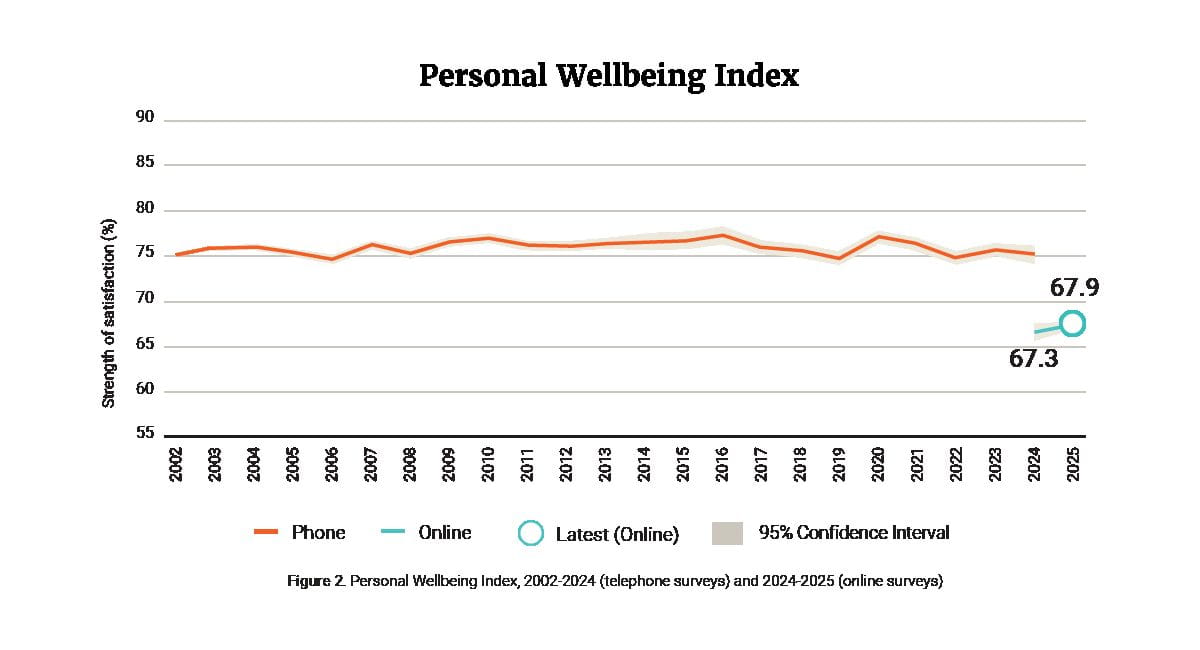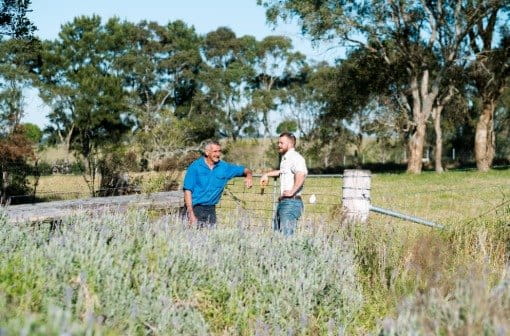“We're programmed biologically to regulate our emotions, which helps us to maintain a stable sense of wellbeing. The environment can influence our capacity to regulate, and sometimes our wellbeing can go up or down, but generally speaking, we tend to come back to a baseline level of wellbeing.”—Clinical psychologist, Delyse Hutchinson
Key points
- In 2025 Australians reported a slight increase in personal wellbeing and a notable uptick in national wellbeing compared to last year, despite ongoing national challenges.
- The results point to the power of homeostasis and demonstrate the resilience of Australians.
- Support is needed for those who don’t have their basic needs met—to get them back to their baseline wellbeing level.
Australians recorded small increases in wellbeing in this year’s Australian Unity Wellbeing Index, the first notable uptick since 2020.
Following the 2020 boost to wellbeing during the first year of the COVID-19 pandemic, there had been a steady decline, with some of the lowest levels of personal and national wellbeing reported in the lifetime of the project. However, this year the downward trend did not continue.
“For national wellbeing, we saw big improvements with satisfaction of the economic situation in Australia and satisfaction with government. For personal wellbeing, things remained quite stable,” said lead researcher, Dr Kate Lycett.
But is it surprising to see boosts in some areas of wellbeing as Australians continue to face ongoing challenges like cost-of-living pressures and a housing shortage?

Improvements in national wellbeing
When it comes to the rise in national wellbeing, Kate says timing could have played a role, as this year’s data collection started just one month after the federal election.
“Australians had the election campaigns, there were big discussions around cost of living, climate change, housing, all the big topical areas and I guess you could say that the government might be having a bit of a honeymoon period,” she says.
“The Labor Government had one of the biggest majorities it's had in a long time in the House of Representatives, and they'd promised action on some of these critical issues. So, at that point in time, people may have been feeling more optimistic about life in Australia.”
Another factor in the boost of Australians’ national wellbeing could be the easing of inflation and interest rate cuts. This may have helped people feel more optimistic about their financial security, and the nation as a whole.
Homeostatic theory of subjective wellbeing
So, what’s at play in the stabilisation of Australians’ personal wellbeing? Kate says given that Australia is a stable, peaceful and democratic country, it's not surprising to see a steadying in this area.
She suggests that the homeostatic theory of subjective wellbeing could be at play.
“The homeostatic theory says that people have a set point of wellbeing and will return to that set point. There are things that happen throughout their lives, but they'll return to that point,” she says.

The resilience of Australians
Clinical psychologist, Delyse Hutchinson, suggests that further to the theory of homeostasis, resilience is also important when it comes to wellbeing.
“Resilience is the notion of being able to bounce back from adversity and to cope under periods of stress,” she said.
“You might have an incident like a car crash or a health issue, or a period of stress at work, for example. Provided the issue or problem causing that can be resolved, we do have capacity to bounce back.”
But Delyse says that whilst Australians as a whole are a resilient bunch, it’s not always just a matter of being more resilient.
“It's very hard for people experiencing major life challenges such as cost of living crises, poverty, or homelessness. These people can’t just say ‘I’m going to be more resilient’.”
In this case, Delyse says we can't wait for homeostasis to improve the wellbeing of people with very low wellbeing.
“We really need more government support to help people in these difficult situations,” she says.
Kate agrees that support is required to bridge the inequality gap.
“During the COVID-19 pandemic we saw policies wrap around people and ensure they didn’t live in poverty. And I think it’s no coincidence that at that time we saw some of the biggest boosts in personal and national wellbeing.”
Building your own resilience
For people who have their basic needs met, Delyse says resilience is a skill that individuals can work to build.
“We know that having a more optimistic outlook and a more flexible way of thinking about things, can really help to bolster resilience.”
Having positive, healthy relationships with others is another critical factor in resilience.
“When you go through periods that are challenging, having others to lean on for support really helps.”
Looking after your mental and physical wellbeing is also crucial to building resilience. Exercising, eating well, getting plenty of sleep and being wary of how much alcohol you drink, can all help. As can having a sense of purpose.
“Having a purpose and a sense of meaning in life, we know, can make a big difference to people's sense of resilience through adversity,” says Delyse.

.jpg)

.jpeg)